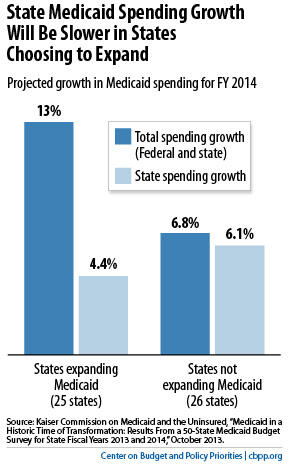off the charts
POLICY INSIGHT
BEYOND THE NUMBERS
BEYOND THE NUMBERS
Kaiser: Costs Will Grow More Slowly in States Expanding Medicaid
Receive the latest news and reports from the Center
The Kaiser Commission on Medicaid and the Uninsured’s annual survey of states on their Medicaid budgets, released yesterday, shows why states should expand Medicaid to adults with incomes below 133 percent of the federal poverty line, as health reform makes possible: in the 25 states that have decided to expand Medicaid, Kaiser projects that state spending on Medicaid will grow by 4.4 percent in 2014 — compared with 6.1 percent for the states that are not moving forward with expansion (see chart).

Medicaid enrollment will grow in all states in 2014 as people who are already eligible enroll for the first time — spurred by health reform’s individual mandate that most Americans have health insurance or pay a penalty, as well as by significant outreach and new simplified enrollment procedures. The federal government will pick up the costs of this increased enrollment at the state’s regular matching rate, which averages 57 percent, leaving the state to pay 43 percent on average.
So, how can Medicaid budgets grow more slowly in states adding tens or hundreds of thousands of newly eligible adults?
The states expanding Medicaid reported to Kaiser that they expect to achieve savings in state-funded services such as mental health care, corrections-related health care, and uncompensated care that they now provide to uninsured individuals who will become newly eligible for Medicaid. And, the federal government will pick up all the costs of covering these newly insured adults in 2014, including 100 percent of the costs of state-funded services they have received until now.
To be sure, total federal and state Medicaid spending will grow faster in expansion states next year — by 13 percent in expansion states, compared with 6.8 percent in non-expansion states. But, that’s due to the federal government paying all the costs of the expansion in 2014.
Expanding Medicaid will help low-income adults get the coverage they need. Kaiser’s survey confirms that it will help state budgets, too.